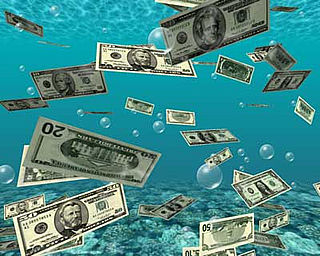Russia wires $15 billion, which complete early debt payment to Paris Club
The prescheduled debt payment gave Russia an opportunity to save some $400 million in 2005

Russia has completed the prescheduled debt payment to the Paris Club of Creditors. The overall sum, which has been paid to the club from the former USSR, makes up $15 billion. Thirteen billion dollars of the sum were wired into two parts on July 15 and 29 to eleven countries (Australia, Great Britain, the Netherlands, Germany, Denmark, Italy, Canada, the USA, France, Finland and Sweden). The rest of the sum, $2.3 billion, has been transferred to five other countries (Austria, Belgium, Spain, Norway and Japan) today, on August 22. The biggest part of the debt was paid to the Paris Club on August 19. 
The prescheduled debt payment gave Russia an opportunity to save some $400 million in 2005. “The amount of funds saved will be evaluated at about $800 million by 2006,” Russian Minister for Finances, Aleksei Kudrin said.
The successful completion of the operation will let Russia improve its investments positions. Fitch Rating international rating agency is ready to award Russia with another investment degree on account of the improved indexes of state finances.
The total debt, which Russia owes the Paris Club of Creditors, makes up some $43 billion. The largest part of the debt has been paid: Germany received its $19 billion on July 15.
It is noteworthy that a lot of Russian specialists split in their opinions regarding the need to pay the debt to the Paris Club ahead of the scheduled time. Only 14 percent of Russian people agree upon the idea to direct surplus oil earnings to pay Russia's foreign debt ahead of the scheduled time. The majority of people think that the government should use the funds for internal social needs, a poll said.
Mikhail Delyagin, the director of the Institute of Globalization Problems, believes that Russia serves Western creditors, but not its own people: “We give the money away to creditors, but we eliminate welfare benefits to pensioners,” the expert said. Even Prime Minister Mikhail Fradkov is quite skeptic about the early debt payment: “We have many other problems to deal with,” Fradkov said.
The proponents of the early debt payment believe, however, that the excessive profit, which Russia receives from high oil prices on the world market, cannot be used for the solution of home matters in Russia. It may raise the inflation rate, which will subsequently nullify all social payments.
According to experts' estimates, any significant unscheduled investment in the economy accelerates the inflation rate up to 0.7 percent a year. The US administration, however, does not hesitate to make huge state-run investments in national infrastructure projects. Last week, for example, George W. Bush signed the law about the modernization of the US transport system: it is planned to spend some $300 billion within six years on the project.
Subscribe to Pravda.Ru Telegram channel, Facebook, RSS!


